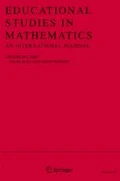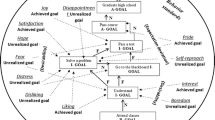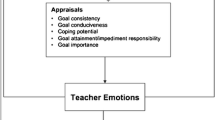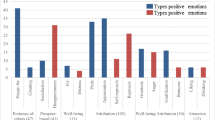Abstract
Little is known about students’ emotions in the field of Mathematics Education that go beyond students’ emotions in problem solving. To start filling this gap this qualitative research has the aim to identify emotional experiences of undergraduate mathematics students in Linear Algebra courses. In order to obtain data, retrospective focus group interviews were carried out with 27 students. Data analysis is based on the theory of cognitive structure of emotions, which specifies eliciting conditions for each emotion and the variables that affect intensity of emotions. Results show that the participants’ emotional experiences in Linear Algebra courses are: satisfaction and disappointment emotions, fear emotions, distress emotions and self-reproach emotions. These emotions are triggered by the appraisal of different situations like the difficulty attributed to Linear Algebra courses, solving problems, asking questions in class, going to the blackboard to solve problems and failure in a course. The students’ emotional experiences are based on their appraisal of the situations in terms of specific goals and standards. Some implications for future research on affect in Mathematics Education are discussed.


Similar content being viewed by others
References
Adams, V. M., & McLeod, D. B. (1989). Affect and mathematical problem solving. A new perspective. New York: Springer Verlag.
Aydin, S. (2014). Using example generation to explore students’ understanding of the concepts of linear dependence/independence in linear algebra. International Journal of Mathematical Education in Science and Technology, 0(0), 1–14. http://doi.org/10.1080/0020739X.2013.877606
Daher, W. (2015). Discursive positionings and emotions in modelling activities. International Journal of Mathematical Education in Science and Technology. doi:10.1080/0020739X.2015.1031836.
DeBellis, V. A., & Goldin, G. A. (2006). Affect and meta-affect in mathematical problem solving: a representational perspective. Educational Studies in Mathematics, 63(2), 131–147. doi:10.1007/s10649-006-9026-4
De Corte, E., Depaepe, F., Op’t Eynde, P., & Verschaffel, L. (2011). Students’ self-regulation of emotions in mathematics: an analysis of meta-emotional knowledge and skills. ZDM The International Journal on Mathematics Education, 43(4), 483–495. doi:10.1007/s11858-011-0333-6
Di Martino, P., & Zan, R. (2011). Attitude towards mathematics: a bridge between beliefs and emotions. ZDM The International Journal on Mathematics Education, 43(4), 471–482. doi:10.1007/s11858-011-0309-6
Di Martino, P., Coppola, C., Mollo, M., Pacelli, T., Sabena, C. (2013). Pre-service primary teachers’ emotions: The math-redemption phenomenon. In A. M. Lindmeier & A. Heinze (Eds.), Proceedings of the 37th Conference of the International Group for the Psychology of Mathematics Education (Vol. 2, pp. 225–232). Kiel, Germany: PME.
Dorier, J. L. (1995). Meta level in the teaching of unifying and generalizing concepts in mathematics. Educational Studies in Mathematics, 29(2), 175–197. doi:10.1007/BF01274212
Dorier, J. L. (Ed.). (2002a). On the teaching of linear algebra (Vol. 23). Dordrecht: Kluwer Academic Publishers. http://doi.org/10.1007/0-306-47224-4
Dorier, J. L. (2002b). Teaching linear algebra at university. In T. Li (Ed.), Proceedings of the International Congress of Mathematicians, ICM (pp. 875–884). Beijing: Higher Education Press.
Dorier, J. L., Robert, A., Robinet, J. R., & Rogalski, M. (2000). The obstacle of formalism in linear algebra. In J. L. Dorie (Ed.), On the teaching of linear algebra (pp. 85–124). Netherlands: Kluwer Academic Publishers.
Ellsworth, P. C. (2013). Appraisal theory: Old and new questions. Emotion Review, 5(2), 125–131. doi:10.1177/1754073912463617
Ellsworth, P. C., & Scherer, K. R. (2009). Appraisal processes in emotion. In R. J. Davidson, K. R. Scherer, & H. H. Goldsmith (Eds.), Handbook of affective sciences (pp. 572–595). New York: Oxford University Press.
Evans, J. (2002). Developing research conceptions of emotion among adult learners of mathematics. Literacy and Numeracy Studies Special Issue on Adults Learning Mathematics, 11(2), 79–94.
Evans, J. (2006). Affect in mathematical thinking and learning; the turn to the social: Sociocultural approaches introduction: Recent developments in research on affect. In J. Maasz & W. Schloeglmann (Eds.), New mathematics education research and practice (pp. 233–255). Rotterdam: Sense Publishers.
Evans, J., Morgan, C., & Tsatsaroni, A. (2006). Discursive positioning and emotion in school mathematics practices. Educational Studies in Mathematics, 63(2), 209–226. doi:10.1007/s10649-006-9029-1
Goldin, G. A. (2000). Affective pathways and representation in mathematical problem solving. Mathematical Thinking and Learning, 2(3), 209–219. doi:10.1207/S15327833MTL0203_3
Goldin, G. A. (2014). Perspectives on emotion in mathematical engagement, learning, and problem solving. In R. Pekrun & L. Linnenbrink-Garcia (Eds.), International handbook of emotions in education (pp. 391–414). New York: Routledge.
Goldin, G. A., Epstein, Y. M., Schorr, R. Y., & Warner, L. B. (2011). Beliefs and engagement structures: Behind the affective dimension of mathematical learning. ZDM The International Journal on Mathematics Education, 43(4), 547–560. doi:10.1007/s11858-011-0348-z
Hannula, M. S. (2006). Motivation in mathematics: Goals reflected in emotions. Educational Studies in Mathematics, 63(2), 165–178. doi:10.1007/s10649-005-9019-8
Hannula, M. S. (2012). Exploring new dimensions of mathematics-related affect: Embodied and social theories. Research in Mathematics Education, 14(2), 137–161. doi:10.1080/14794802.2012.694281
Hannula, M. S., Pantziara, M., Wæge, K., Schlöglmann, W. (2010). Introduction multimethod approaches to the multidimensional affect in mathematics education. In V. Durand-Guerrier, S. Soury-Lavergne, & F. Arzarello (Eds.), Proceedings of the Sixth Congress of the European Society for Research (pp. 28–33). Lyon, France: CERME.
Imada, T., & Ellsworth, P. C. (2011). Proud Americans and lucky Japanese: Cultural differences in appraisal and corresponding emotion. Emotion, 11, 329–345.
Keller, M. M., Frenzel, A. C., Goetz, T., Pekrun, R., & Hensley, L. (2014). Exploring teacher emotions. In P. W. Richardson, S. A. Karabenick, & H. M. G. Watt (Eds.), Teacher motivation: Theory and practice (pp. 69–82). New York: Routledge.
Mandler, G. (1989). Affect and learning: Causes and consequences of emotional interactions. In D. B. McLeod & V. M. Adams (Eds.), Affect and mathematical problem solving: A new perspective (pp. 3–19). New York: Springer Verlag.
Martínez-Sierra, G., & García-González, M.D.S. (2014). High school students' emotional experiences in mathematics classes. Research in Mathematics Education, 16 (3), 234–250.
McCulloch, A. W. (2011). Affect and graphing calculator use. The Journal of Mathematical Behavior, 30(2), 166–179. doi:10.1016/j.jmathb.2011.02.002
McLeod, D. B. (1992). Research on affect in mathematics education: A reconceptualization. In D. A. Grouws (Ed.), Handbook of research on mathematics teaching and learning (pp. 575–596). New York: Macmillan.
Meyer, D. K., & Turner, J. C. (2006). Re-conceptualizing emotion and motivation to learn in classroom contexts. Educational Psychology Review, 18(4), 377–390. doi:10.1007/s10648-006-9032-1
Moors, A., Ellsworth, P. C., Scherer, K. R., & Frijda, N. H. (2013). Appraisal theories of emotion: State of the art and future development. Emotion Review, 5(2), 119–124. doi:10.1177/1754073912468165
Oatley, K., & Johnson-Laird, P. N. (2014). Cognitive approaches to emotions. Trends in Cognitive Sciences, 18(3), 134––40. doi:10.1016/j.tics.2013.12.004
Op’ T Eynde, P., De Corte, E., & Verschaffel, L. (2006). Accepting emotional complexity”: A socio-constructivist perspective on the role of emotions in the mathematics classroom. Educational Studies in Mathematics, 63(2), 193–207. doi:10.1007/s10649-006-9034-4
Op’ T Eynde, P., De Corte, E., & Verschaffel, L. (2007). Students’ emotions: A key component of self-regulated learning? In P. A. Schutz & R. Pekrun (Eds.), Emotion in education (pp. 185–204). Burlington: Academic.
Ortony, A., Clore, G. L., & Collins, A. (1988). The cognitive structure of emotions. Cambridge: Cambridge University Press.
Pantziara, M., & Philippou, G. N. (2015). Students’ motivation in the mathematics classroom. Revealing causes and consequences. International Journal of Science and Mathematics Education, 13(2), 385–411. doi:10.1007/s10763-013-9502-0
Parraguez, M., & Oktaç, A. (2010). Construction of the vector space concept from the viewpoint of APOS theory. Linear Algebra and Its Applications, 432(8), 2112–2124. doi:10.1016/j.laa.2009.06.034
Pekrun, R. (2006). The control-value theory of achievement emotions: Assumptions, corollaries, and implications for educational research and practice. Educational Psychology Review, 18(4), 315–341. doi:10.1007/s10648-006-9029-9
Pekrun, R., Goetz, T., Titz, W., & Perry, R. P. (2002). Academic emotions in students’ self-regulated learning and achievement: A program of qualitative and quantitative research. Educational Psychologist, 37(2), 91–105. doi:10.1207/S15326985EP3702_4
Pekrun, R., Frenzel, A. C., Goetz, T., & Perry, R. P. (2007). The control-value theory of achievement emotions: An integrative approach to emotions in education. In P. A. Schutz & R. Pekrun (Eds.), Emotion in education (pp. 13–36). Amsterdam: Academic.
Pepin, B., & Roesken-Winter, B. (Eds.) (2015). From beliefs to dynamic affect systems in mathematics education. Zürich, Switzerland: Springer. http://doi.org/10.1007/978-3-319-06808-4
Radford, L. (2015). Of Love, Frustration, and Mathematics: A Cultural-Historical Approach to Emotions in Mathematics Teaching and Learning. In B. Pepin & B. Roesken-Winter (Eds.), From beliefs to dynamic affect systems in mathematics education (pp. 25–49). Springer International Publishing. http://doi.org/10.1007/978-3-319-06808-4_2
Schoenfeld, A. H. (1985). Mathematical problem solving. San Diego: Academic.
Turner, J. C., Warzon, K. B., & Christensen, A. (2010). Motivating mathematics learning: Changes in teachers’ practices and beliefs during a nine-month collaboration. American Educational Research Journal, 48(3), 718–762. doi:10.3102/0002831210385103
Acknowledgments
The research reported in this article was supported by the National Council of Science and Technology of Mexico (CONACYT, Basic Scientific Research 2012: 178564) and by Autonomous University of Guerrero (México). We appreciate the help of the teacher Ofelia Montelongo in conducting the fieldwork and the help of Marisa Miranda Tirado in revising this manuscript. We are very grateful to the anonymous reviewers for their valuable suggestions for improving this paper.
Author information
Authors and Affiliations
Corresponding author
Rights and permissions
About this article
Cite this article
Martínez-Sierra, G., García-González, M. Undergraduate mathematics students’ emotional experiences in Linear Algebra courses. Educ Stud Math 91, 87–106 (2016). https://doi.org/10.1007/s10649-015-9634-y
Published:
Issue Date:
DOI: https://doi.org/10.1007/s10649-015-9634-y




